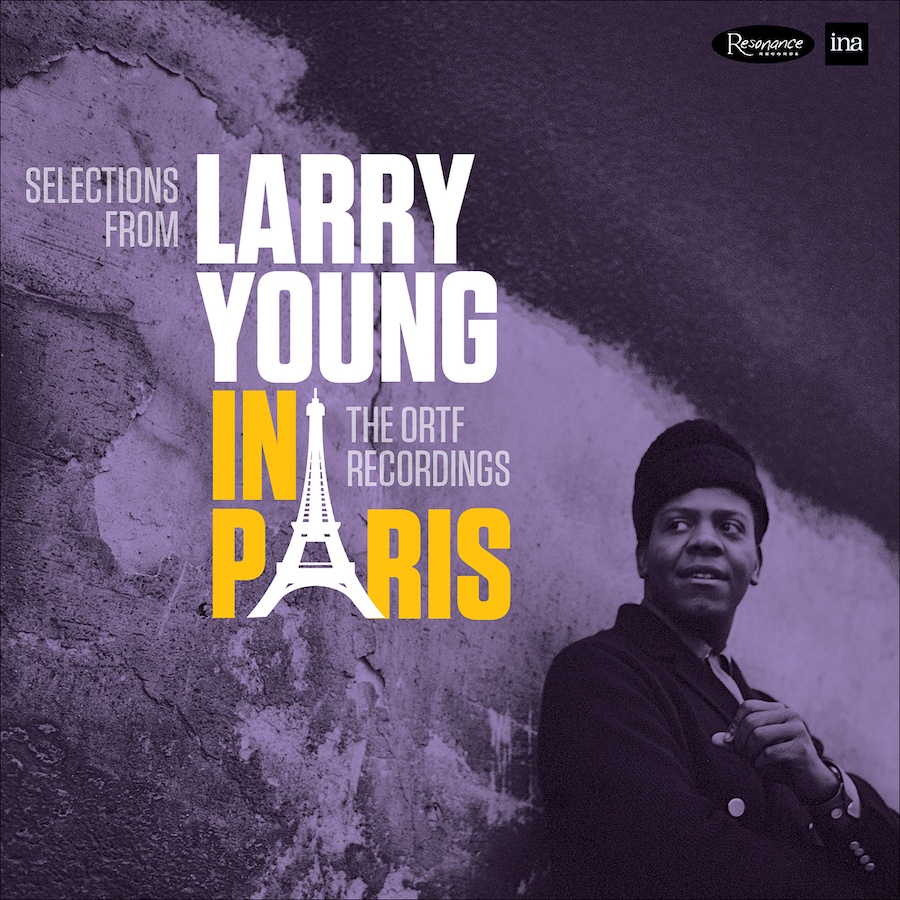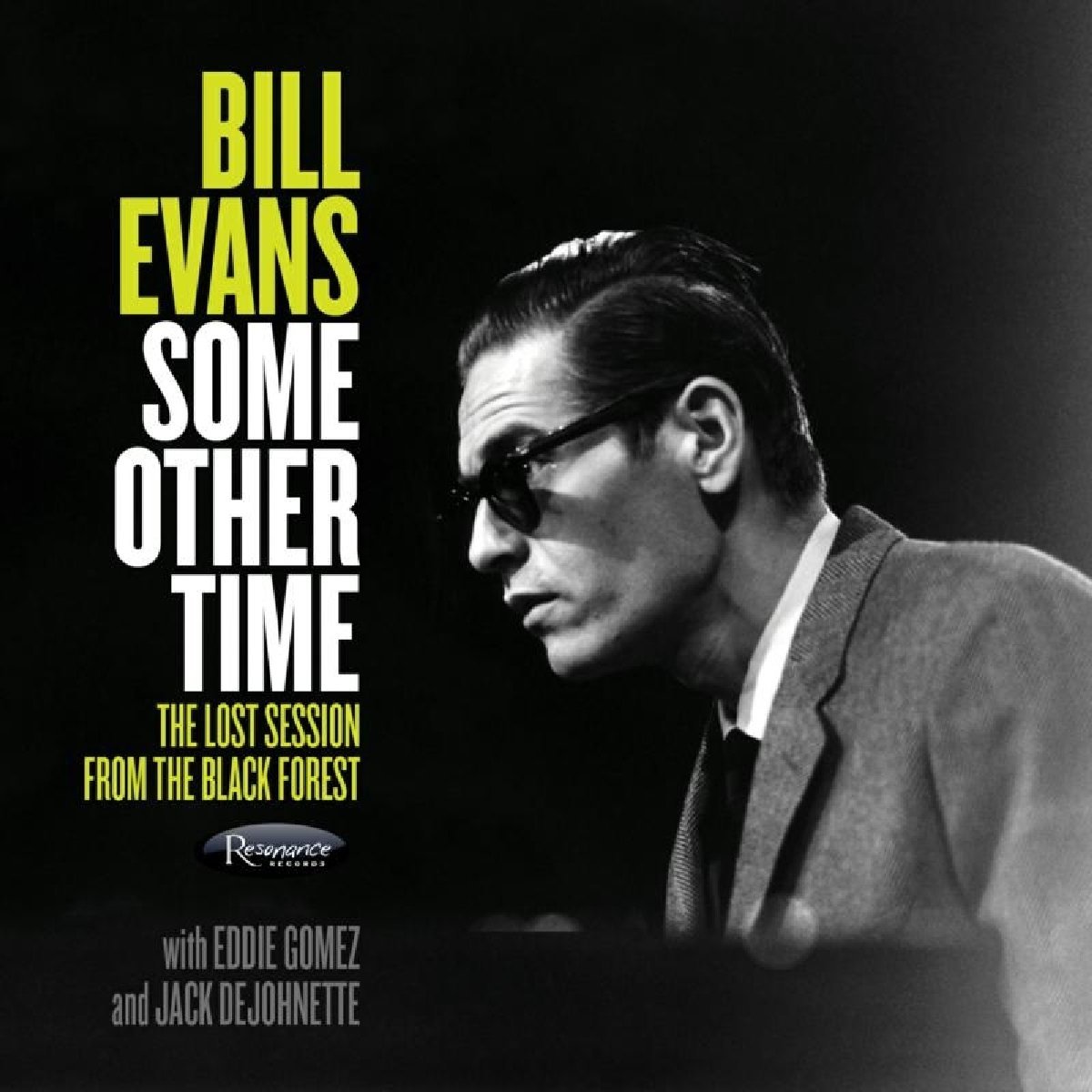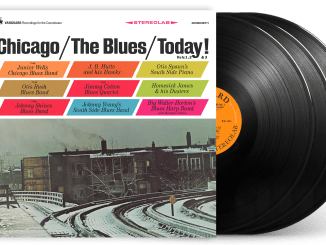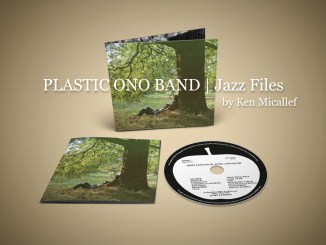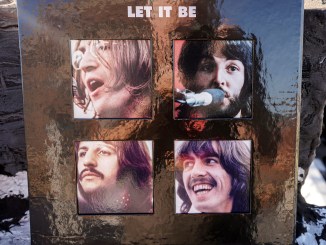By Ken Micallef
Larry Young
In Paris: The ORTF Recordings

Perhaps the paramount track on Larry Young In Paris: The ORTF Recordings (available here) is a 13-minutes-plus version of Wayne Shorter’s “Black Nile.” As heard on Shorter’s brilliant Night Dreamer LP, the original recording is a streamlined brew of dream-like, nocturnal fury, with trumpeter Lee Morgan, pianist McCoy Tyner, bassist Reggie Workman and drummer Elvin Jones raising the composition’s middle-eastern tinged melody into an improvisation of heroic proportions. Night Dreamer wasn’t a year old when the ensemble of B3 organist Larry Young, tenor saxophonist Nathan Davis, trumpeter Woody Shaw and drummer Billy Brooks recorded “Black Nile” for radio broadcast at an annual gathering of l’Academie de jazz, at Paris’ La Locomotive club on February 9, 1965.
The quartet performance gives you some idea of the state of the jazz frontier in 1965, with allusions to the explosions wrought by Eric Dolphy and Coltrane in the center, and the impact of Albert Ayler near the edges. Nothing is held back in this blistering recital, with brilliant solos from Woody Shaw (who is mind-blowing throughout) and the sadly forgotten Davis. But we must wait nearly until the end of the selection to hear the spellbinding, otherworldly solo of Larry Young, who even today seems miles ahead of organists then and now.

While most Hammond B3 thrillers of the ‘60s were sopping up grits and gravy — think Jack McDuff, the sophisticated Charles Earland, Jimmy Smith, John Patton, and my favorite Shirley Scott, Larry Young arrived from another planet (Newark) entirely. The son of a professional organist, Larry Young studied under a student of Bartok. This helps to explain Young’s unusual harmonic structures and use of pentatonic scales in compositions that scalded the senses. While most organists of the period were entirely earth-bound, Larry Young seemed to have arrived from outer space, channeling Coltrane as his he hit the atmosphere. Young’s advanced concepts and at times, jolly soloing, are heard to full effect on his celebrated Blue Note recordings: Into Somethin’ (1964), Unity (1965), Of Love and Peace (65), Contrasts (67), Heaven on Earth (68) and Mother Ship (69). Before cutting those seminal sides, Young embarked for Paris as so many jazz artists before him, where he recorded with various groups for Paris-based ORTF Studios.
In Paris: The ORTF Recordings documents Young’s Parisian days and studio recordings with the Nathan Davis Quartet, formed to honor the spirit of Eric Dolphy; the rather homogenous Jazz aux Champs-Elysees All Stars which included Woody Shaw, a French drummer, pianist and inane bongo player; and an interesting trio that included Young on piano and/or organ with drummer Franco Manzecchi and said inane bongo/conga player, “Jacky Bamboo.” All of these tracks were recorded specifically for French radio broadcast on two iconic programs: Musique aux Champs-Elysees, and Jazz sur Scene, the latter producing many programs that have been reissued on recent Barclay and Philips’ releases. Resonance producer Zev Feldman gained entrance to ORTF’s vaults, where he uncovered these rare Young recordings.
The double-LP set includes essays on Young’s brilliance by John McLaughlin and Jack Bruce (Young’s band-mates in Tony Williams’ innovative Lifetime groups), Larry Young III and Woody Shaw III, among others. Pressed on 180-gram vinyl at RTI, Larry Young In Paris: The ORTF Recordings is yet another notch in Resonance’s belt, a label which increasingly ranks with Mosaic for unearthing jazz treasures.
Tracks include a 20-minute version of the thunderous “Zoltan” (which appeared on Unity), and such previously unknown Young compositions as “Talkin’ About J.C.,” “Luny Tune” (which reveals Young‘s melodic logic in a trio of bass, drums and conga), “Larry’s Blues,” and more. The LP set includes a download card, five postcards, and 12-page booklet. (A more in-depth booklet is included with the CD release, but I find the extra information to be largely superfluous.)
The recording quality and reproduction on both LPs is, for the most part, excellent, especially given the source materials. “Black Nile” and “Zoltan” are the most off-the-cuff and raw from what appear to be haphazard micing techniques. But the music is so relentless and revealing, you’ll be too caught up in the performances to notice the moderately subpar sound. Priced at 24.98 for the double-CD, and 49.98 for the double-LP (limited to 2000 pressings), and mastered by Bernie Grundman, Larry Young In Paris: The ORTF Recordings is easily one of the finest archival releases of 2016, second only to the following Resonance release:
Bill Evans
Some Other Time: The Lost Session from the Black Forest

Recorded at a pivotal moment in pianist Bill Evans’ career, this two-LP RSD exclusive (available here) details what critic and album essayist Marc Myers calls Evans’ “percussive poet” phase, featuring “a more robust, confident piano approach with pronounced chord and finger strikes and an increasingly agitated, almost rushed feel.” I don’t hear music being “rushed” (not to take anything away from Myers’ always astute observations), but rather an effusive pianist supported by two perennial jazz craftsmen, bassist Eddie Gomez and drummer Jack DeJohnette.
Secreted away for nearly 50 years, The Lost Session from the Black Forest was recorded just days after Evans’ trio’s appearance at the Montreux Jazz Festival, documented on the Verve release, Bill Evans at the Montreux Jazz Festival. That was only a foretaste of the wealth of music heard on this exceptionally well-recorded and digitally transferred (at 24/192) Resonance disc, which was originally recorded for the German MPS label, which is enjoying reissue renaissance of its own at the moment.
In the album’s liner notes Resonance producer Zev Feldman outlines the tale of discovering these recordings while attending a JazzAhead conference in Bremen, Germany, 2013. A son of MPS founder Hans Georg Brunner-Schwer told Feldman that the label still held the Evans recordings in their vaults. After gaining releases from the Evans’ estate, Gomez and DeJohnette, Resonance got to work creating the kind of package for which they are becoming renown. The recordings on disc one contain material that MPS originally intended for release, but was unable to do so after failing to reach an agreement with Helen Keane, who represented Evans from 1963 until his death in 1980. After delving into all the Evans’ material found in the MPS vaults, Feldman deemed the remaining tracks worthy for inclusion in a grand two-disc release.

The Lost Session from the Black Forest is a fully immersive and rewarding recording on many levels. An interview with Jack DeJohnette reveals Evans’ playing preferences at the time.
“He was trying to make friends with [a new piano] so you can hear he’s kind of pushing it a little bit,” DeJohnette notes. “Not quite getting what he wants to hear from the instrument. But as a result, it’s a different kind of touch with Bill’s playing there. It’s a little stronger than normal, than you would usually hear him play.”
Evans’ strength prods his trio to play more forcefully, yet very expressively as you’d expect with players of this caliber. The performances on such chestnuts as “I’ll Remember April,” “In A Sentimental Mood,” and “On Green Dolphin Street” are uniformly rich, dynamic and revealing. Evans sounds like he is in a good place mentally and emotionally; his musicianship is sparkling throughout.
The LP sounds excellent, especially in how it reveals Eddie Gomez’s bass. The bass is almost too strong at times, fully occupying the right channel. DeJohnette’s drums are by contrast, recorded lightly and off to the left channel. The two-album set is divided into 12 trio tracks, two solo performances (“It’s All Right with Me,” “Lover Man”), and five duo recordings. It would have been nice to hear DeJohnette’s drums recorded as strongly as Gomez’s bass and perhaps mixed dead center in the mix. As it is, the drums sometimes sound like light percussive accompaniment. But then, Evans is the main attraction. And the music is uniformly powerful, inspiring and swinging.
The Lost Session from the Black Forest reveals another side in Evans’ storied career, with a trio as captivating as the Evans/LaFaro/Motian lineup. It’s an exceptional release — and essential for every jazz fan. It’s a welcome addition to an eminent catalog of one of the most revered, influential and imitated pianists of the 20th century.
“Bill shouldn’t be forgotten,” says DeJohnette. “His contribution is great and continues to this day. There’s still a lot of piano information out there and I hope this recording will give people new perspectives and insights on Bill as a leader and as a major influence on piano playing and jazz music in general.”
About the Author
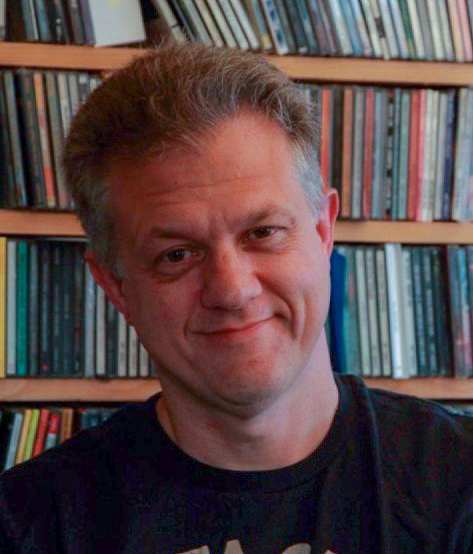 When not rustling words for DownBeat, Electronic Musician, Bass Player and Modern Drummer magazines, Ken Micallef feeds his vinyl LP habit, photographs New York City’s remaining neighborhoods, and reviews audio equipment for PFO. A native of Detroit, Michigan, Ken currently resides in Greenwich Village, New York City, a swift subway ride to the city’s well stocked and overpriced used vinyl stores. His LP prizes often find their way to his Facebook page, Jazz Vinyl Lovers, where love of jazz and the occasional turntable photo keeps heads turning and the conversation buzzing.
When not rustling words for DownBeat, Electronic Musician, Bass Player and Modern Drummer magazines, Ken Micallef feeds his vinyl LP habit, photographs New York City’s remaining neighborhoods, and reviews audio equipment for PFO. A native of Detroit, Michigan, Ken currently resides in Greenwich Village, New York City, a swift subway ride to the city’s well stocked and overpriced used vinyl stores. His LP prizes often find their way to his Facebook page, Jazz Vinyl Lovers, where love of jazz and the occasional turntable photo keeps heads turning and the conversation buzzing.
Raised in the Deep South, educated as a commercial artist, Micallef is also a regular contributor to Autodesk’s lineshapespace.com online business magazine, where Smart Buildings, Industry 4.0, and the Internet of Things provide grist for the mill of future design and cloud-based and 3D manufacturing.
Ken’s current rig includes Shindo electronics, DeVore Fidelity and Snell speakers, a Kuzma turntable and various cartridges.
You can find more of Ken on his website, his photo site Greenwich Village Daily Photo.
Financial Interests: Ken contributes to several music-related media outlets including Positive Feedback Online and Digital Audio Review.ts: Ken contributes to several music-related media outlets including Positive Feedback Online and Digital Audio Review.

